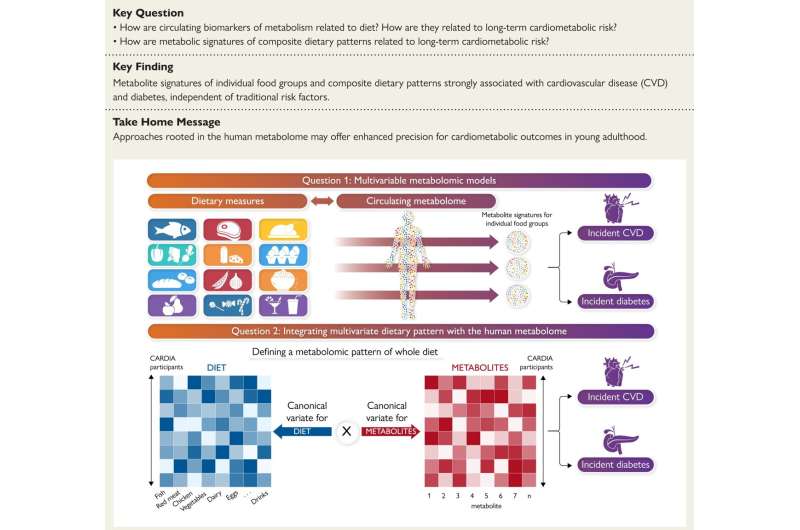Blood-based metabolic signature outperforms standard method for predicting diet, disease risk

When it comes to studying food and diet, it's difficult to know what people are eating—let alone their risk of disease caused by what they eat.
Doctors and researchers usually ask people to fill out a long-from food frequency questionnaire that estimates caloric intake, food groups and nutrients. That relies on a person's memory and may not provide the most accurate picture.
However, a research team led by a Michigan Medicine cardiologist have found a method using molecular profiling and machine learning to develop blood-based dietary signatures that more accurately predict both diet and the risk of cardiovascular disease and type 2 diabetes. The results are published in European Heart Journal.
"Diet is not one dimensional; it's constantly changing, and the ways we traditionally assess it are not perfect," said senior author Venkatesh Murthy, M.D., Ph.D., a cardiologist at the University of Michigan Health Frankel Cardiovascular Center and an associate professor of cardiology at U-M Medical School.
"We need tools that are more reliable and precise while also being easy to use for everyone. Using metabolite signatures and data science, we can improve our understanding of how much people are actually taking in, as well as what risks they may incur for cardiometabolic disease that affect millions of Americans," Murthy said.
Researchers followed more than 2,200 white and Black adults in the Coronary Artery Risk Development in Young Adults study, using blood samples and food surveys to determine metabolite signatures of diet and subsequent disease risk over 25 years. Through a machine learning model, investigators were able to create a blood-based dietary signature that more accurately predicts a person's entire diet over 19 food groups by 10-20%.
Additionally, the blood-based signature often outperformed the healthy eating index, a standard measure of diet quality, for identifying who is more likely to develop both diabetes and cardiovascular disease based on each food group. For example, when the food frequency questionnaire indicated an 18% increase in the risk of diabetes for a person eating red meat, the blood-based signature found a 55% increased risk.
"The use of metabolites to understand food exposures and nutrition is an expanding area in nutritional science," said co-author Ravi Shah, M.D., cardiologist and associate professor of medicine at Vanderbilt University Medical Center. "Beyond understanding what types of nutrition are better or worse for our health, the methods here could allow those studying food science to take a metabolic snapshot of nutrition and diet to better understand their implications on health."
The blood-based signature technique, researchers say, needs to be tested in prospective, controlled studies of different diets. Knowing precisely how well people are adhering to a diet using blood-based signatures, Murthy says, will create even stronger results.
"Diet and nutritional research are really difficult," Murthy said. "We see this as an important step and set of tools to do nutritional research with greater precision and efficiency. Eventually, such work may allow us to better understand optimal diets for our patients."
More information: Ravi V Shah et al, Dietary metabolic signatures and cardiometabolic risk, European Heart Journal (2022). DOI: 10.1093/eurheartj/ehac446




















